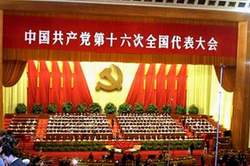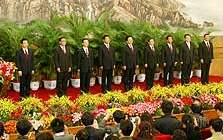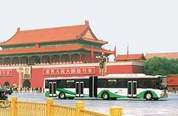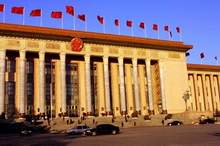 |
|
| Special series: 2002, A Year In Review |
| CCTV.COM 2002-12-20 14:12:39 |
|

2002 has been viewed as a successful and smooth year in China's development and transformation in various sectors. Many memorable events have impacted the country's destiny, as well as people's lives.
This special series presents an overall review of the major news events in China over the past year, and explain their potential impact on the country's development.
CCTV International will also select the top ten news events in China and around the world in 2002.
Today, it begins with China's political changes.
The 16th National Party Congress, which resulted in the election of the CPC's new leadership, as well as the changes in the party's Constitution, is widely viewed as the number one political event in China in 2002.
1. Political changes reshape nation

When Jiang Zemin made his entrance at the 16th National Party Congress on November 8, he was ready for change in the Party.
As the core of the People's Republic of China's "third generation" of leadership, Jiang Zemin has continued to energetically lead China toward a more prosperous economy.
During the 16th National Party Congress, he broke new ground by introducing outstanding private entrepreneurs into the party, something that had never happened in the 80-year history of the CPC. Among many other accomplishments, his efforts to create a dynamic new CPC leadership have been regarded as an important contribution to the Party building and its development.
"The bringing in of the new leadership is a demonstration of democracy within the party. It reflects the demands of the times. The smooth transfer of power will have a far-reaching impact on the party's operating process in a more democratic way," said Shi Zhongquan, deputy director of Party History Research Center, CPC Central Committee.
The final goal of the Party Congress was fulfilled on November 15, with the Party's central collective leadership achieving a smooth transition. Almost all members of the current Politburo Standing Committee are new, with newly-elected General Secretary Hu Jintao the only member of the outgoing standing committee to stay.
The transition was hailed, even by some western analysts, as evidence that China's politics are stable, and its leaders are confident.
Political economist Laurence J. Brahm said: "Here you can see that emergence of a very systematic transfer of power, which is going to be institutionalizing the transfer of power within the Chinese politics. For China, it's a big step forward. "
Equally important to the leadership change was an amendment to the Party Constitution. The new Constitution says the Party represents the interests of all of the Chinese people and the Chinese nation, not only just the working class that formed the base of the party in the past. The changes originated from the "Three Represents" Thought, which called on the Party to always represent: First, the development trend of China's advanced productive forces; Second, the orientation of advanced culture;and Third, the fundamental interest of the overwhelming majority of the Chinese people.
 The "Three Represents" Thought has been incorporated into the Party Constitution, and was hailed as a major achievement that will bring positive changes to the CPC. The "Three Represents" Thought has been incorporated into the Party Constitution, and was hailed as a major achievement that will bring positive changes to the CPC.
"Putting the 'Three Represents' Thought into the CPC Constitution is a way to legitimize the thought's supreme position in guiding the party's actions. This will make the 'Thought' a long-term principle for all members, and it will be a milestone for the CPC's party building," said Zhang Qi, senior research fellow of Party History Research Center.
Political reform was yet another factor of progress. In July of this year, the CPC Central Committee issued a regulation for "Selecting and Appointing Party and Governmental Officials". Based on the new regulation, officials at all levels must be selected through an open process. The regulation aims at curbing the "abuse of power" at its roots, and strengthens guidelines for selecting top talents for official positions.
Experts say this can usher in a more institutionalized and rational leadership selection process, as well as create a better mechanism for supervision and responsibility.
 Zhao Ziping, vice-president of Institute of Party Building, said: " The formulating of the regulation, marked a major step forward for the CPC, in creating a systematic approach in selecting and appointing officials. This will help to reform the party's operating process in a more scientific and democratic way. It will have far reaching impact on the party, as well as the nation's healthy development." Zhao Ziping, vice-president of Institute of Party Building, said: " The formulating of the regulation, marked a major step forward for the CPC, in creating a systematic approach in selecting and appointing officials. This will help to reform the party's operating process in a more scientific and democratic way. It will have far reaching impact on the party, as well as the nation's healthy development."
China's efforts to fight against corruption have also received a lot of recognition during the past year. In October, the Supreme People's Court sentenced Zhu Xiaohua, one of the country's top bankers, to 15 years imprisonment. Zhu was accused of accepting some 500,000 US dollars in bribes. And only a week ago, Shenzhen's former customs chief, Zhao Yucun, was also jailed for life for taking millions of yuan in bribes.
As China intensifies anti-corruption efforts, more corruption cases are being exposed. Although it might take some time to completely fulfill the government's target of cleaning up institutions all across the board, China's process of political reform is well on track.
The year 2002 will be remembered for the remarkable headway of China's political reform. Building upon this trend, many believe that the party's new leaders will continue serving Chinese citizens in the coming new year by writing their own chapter in China's ongoing progress and development.
|
|
Editor: Xiao Wei CCTV.com
|
|
|
|
|
|
 |









